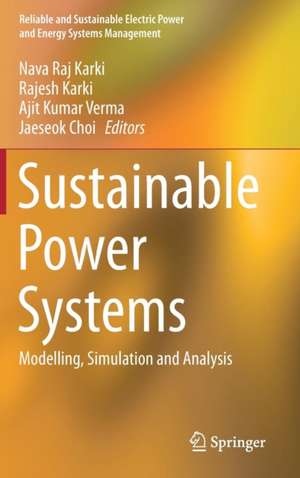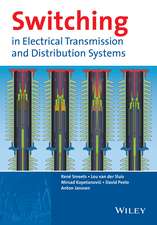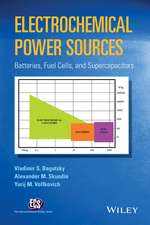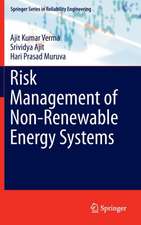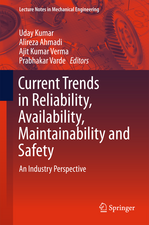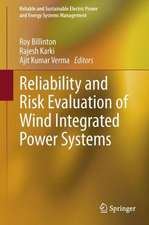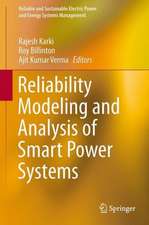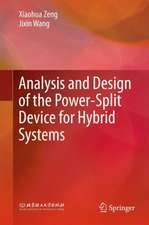Sustainable Power Systems: Modelling, Simulation and Analysis: Reliable and Sustainable Electric Power and Energy Systems Management
Editat de Nava Raj Karki, Rajesh Karki, Ajit Kumar Verma, Jaeseok Choien Limba Engleză Hardback – 18 ian 2017
| Toate formatele și edițiile | Preț | Express |
|---|---|---|
| Paperback (1) | 776.09 lei 3-5 săpt. | |
| Springer Nature Singapore – 13 iul 2018 | 776.09 lei 3-5 săpt. | |
| Hardback (1) | 685.39 lei 38-44 zile | |
| Springer Nature Singapore – 18 ian 2017 | 685.39 lei 38-44 zile |
Preț: 685.39 lei
Preț vechi: 901.82 lei
-24% Nou
Puncte Express: 1028
Preț estimativ în valută:
131.17€ • 136.43$ • 108.28£
131.17€ • 136.43$ • 108.28£
Carte tipărită la comandă
Livrare economică 08-14 aprilie
Preluare comenzi: 021 569.72.76
Specificații
ISBN-13: 9789811022296
ISBN-10: 9811022291
Pagini: 185
Ilustrații: XIV, 174 p. 76 illus.
Dimensiuni: 155 x 235 x 13 mm
Greutate: 0.45 kg
Ediția:1st ed. 2017
Editura: Springer Nature Singapore
Colecția Springer
Seria Reliable and Sustainable Electric Power and Energy Systems Management
Locul publicării:Singapore, Singapore
ISBN-10: 9811022291
Pagini: 185
Ilustrații: XIV, 174 p. 76 illus.
Dimensiuni: 155 x 235 x 13 mm
Greutate: 0.45 kg
Ediția:1st ed. 2017
Editura: Springer Nature Singapore
Colecția Springer
Seria Reliable and Sustainable Electric Power and Energy Systems Management
Locul publicării:Singapore, Singapore
Cuprins
Chapter 1. Reliability Assessment of Power Grid Supporting Sustainable Transportation (Xue Wang and Rajesh Karki).- Chapter 2. Hybrid AC/DC Micro-Grids: Solution for High Efficient Future Power Systems (Peng Wang, Jianfang Xiao, Chi Jin, Xiaoqing Han and Wenping Qin).- Chapter 3. Low Voltage Ride Through of Wind Energy Systems (Mehrdad Tarafdar Hagh and Kashem Mohammad Muttaqi).- Chapter 4. Reliability Evaluation of Distribution System with Network Reconfiguration and Distributed Generations (P Pavani and S N Singh).- Chapter 5. Tracing the Unreliability and Recognizing the Weak Parts of a Power System (Kaigui Xie).- Chapter 6. Sustainable Energy Optimization in a Smart Microgrid (Ryan Jansen and Rajesh Karki).-Chapter 7. Renewable Energy Generation System Expansion Planning (Jaeseok Choi).- Chapter 8. Microhydro Based Mini Grid for Sustainable Development of Rural Communities: A Case Study of Nepal (Netra Pd. Gyawali).
Notă biografică
Nava Raj Karki obtained his M.Sc. (Hons) in Electrical Engineering from Belarussian National Technical University, Minsk in 1995 and Ph.D. in Electrical Engineering from Indian Institute of Technology, Bombay in 2011. He joined Department of Electrical Engineering, Institute of Engineering, Tribhuvan University in 1995 and is currently an Associate Professor and Head of the Department. He is actively involved in IEEE activities and is the founding Vice Chair of IEEE Nepal Subsection. Dr. Nava Raj Karki is very strongly promoting Academia-Industry collaboration at the Institute of Engineering and various multilateral initiatives like Erasmus Mundus Programme. He has published several papers on power system planning, reliability, distributed generation and restructuring and published a book on Electrical Engineering Materials.
<Rajesh Karki obtained his B.E. degree in electrical engineering from the Regional Engineering College (renamed National Institute of Technology), Durgapur, West Bengal, India in 1991, and M.Sc. and Ph.D. degrees in electrical power engineering in 1997 and 2000 respectively from the University of Saskatchewan, Canada. He worked for academic institutions and different industries in Nepal between 1991 and 1995, and for GE Industrial Systems, Peterborough, ON, Canada during 2000-2002. He joined the University of Saskatchewan, Canada as an Assistant Professor in 2002, where he currently works as an Associate Professor. During 2005-2012, he chaired the Power Systems Research Group at the University of Saskatchewan. He has served in various capacities in conferences and workshops, gave lectures in Canada and has published over 80 papers in reputed international journals and peer reviewed conferences. Dr. Karki has completed several consulting projects on system planning and reliability for Canadian electric utilities. He is a Senior Member of the IEEE, and a Professional Engineer in the Province of Saskatchewan, Canada. His research interests include power system reliability and planning, and reliability modeling and analysis of renewable energy systems. Ajit K. Verma obtained B.Tech. (Electrical Engineering) and Ph.D. (Reliability Engineering) from Indian Institute of Technology Kharagpur, India in 1984 and 1988 respectively. He joined Indian Institute of Technology Bombay in 1988 where he holds the position of Professor of Electrical Engineering. He is currently working as a Professor of Technical Safety at University College Stord/Haugesund, Norway. He has supervised/co-supervised 28 doctoral and 88masters thesis in the area of Software Reliability, Reliable Computing, Power Systems Reliability (PSR), Reliability Centered Maintenance (RCM) and Probabilistic Safety/Risk Assessment (PSA). He has over 195 publications in various journals and conferences. He is a senior member of IEEE and a life fellow of IETE. He is the Editor-in-Chief of the International Journal of Systems Assurance Engineering and Management (IJSAEM) published by Springer, as well as a member of the Advisory Committee for the journal OPSEARCH also published by Springer. He has served as a Guest Editor of many international journals including IEEE Transactions on Reliability March, 2010. He has been the Conference Chairman of various International conferences and symposia.
Jaesok Choi is a Professor at Gyeongsang National University, Korea and has been teaching at the university since 1991. He did his masters and obtained his Ph.D. from Korea University in 1984 and 1990, respectively. He completed his post-doctoral research at University of Saskatchewan, Canada in 1996. He has published many papers in reputed international journals and conference proceeding, and undertaken many projects funded by the Korean Electric Power Corporation. His research interests include fuzzy applications, probabilistic production cost simulation, reliability evaluation and outage cost assessment of power systems, and development of flexible methods for power system. His recent research is specially focused on development and extension of methodology at load points of Composite Power Systems.
<Rajesh Karki obtained his B.E. degree in electrical engineering from the Regional Engineering College (renamed National Institute of Technology), Durgapur, West Bengal, India in 1991, and M.Sc. and Ph.D. degrees in electrical power engineering in 1997 and 2000 respectively from the University of Saskatchewan, Canada. He worked for academic institutions and different industries in Nepal between 1991 and 1995, and for GE Industrial Systems, Peterborough, ON, Canada during 2000-2002. He joined the University of Saskatchewan, Canada as an Assistant Professor in 2002, where he currently works as an Associate Professor. During 2005-2012, he chaired the Power Systems Research Group at the University of Saskatchewan. He has served in various capacities in conferences and workshops, gave lectures in Canada and has published over 80 papers in reputed international journals and peer reviewed conferences. Dr. Karki has completed several consulting projects on system planning and reliability for Canadian electric utilities. He is a Senior Member of the IEEE, and a Professional Engineer in the Province of Saskatchewan, Canada. His research interests include power system reliability and planning, and reliability modeling and analysis of renewable energy systems. Ajit K. Verma obtained B.Tech. (Electrical Engineering) and Ph.D. (Reliability Engineering) from Indian Institute of Technology Kharagpur, India in 1984 and 1988 respectively. He joined Indian Institute of Technology Bombay in 1988 where he holds the position of Professor of Electrical Engineering. He is currently working as a Professor of Technical Safety at University College Stord/Haugesund, Norway. He has supervised/co-supervised 28 doctoral and 88masters thesis in the area of Software Reliability, Reliable Computing, Power Systems Reliability (PSR), Reliability Centered Maintenance (RCM) and Probabilistic Safety/Risk Assessment (PSA). He has over 195 publications in various journals and conferences. He is a senior member of IEEE and a life fellow of IETE. He is the Editor-in-Chief of the International Journal of Systems Assurance Engineering and Management (IJSAEM) published by Springer, as well as a member of the Advisory Committee for the journal OPSEARCH also published by Springer. He has served as a Guest Editor of many international journals including IEEE Transactions on Reliability March, 2010. He has been the Conference Chairman of various International conferences and symposia.
Jaesok Choi is a Professor at Gyeongsang National University, Korea and has been teaching at the university since 1991. He did his masters and obtained his Ph.D. from Korea University in 1984 and 1990, respectively. He completed his post-doctoral research at University of Saskatchewan, Canada in 1996. He has published many papers in reputed international journals and conference proceeding, and undertaken many projects funded by the Korean Electric Power Corporation. His research interests include fuzzy applications, probabilistic production cost simulation, reliability evaluation and outage cost assessment of power systems, and development of flexible methods for power system. His recent research is specially focused on development and extension of methodology at load points of Composite Power Systems.
Textul de pe ultima copertă
This book deals with quantifying and analyzing the risks associated with sustainable energy technology growth in electric power systems, and developing appropriate models and methodologies to mitigate the risks and improve the overall system performance. The rapid increase in the installation of renewable energy sources in electric power systems has given rise to a wide range of problems related to planning and operation of power systems to maintain quality, stability, reliability and efficiency. Additionally, there is a growing global environmental concern regarding increasing emissions from the electric power generation required to meet rising energy needs and support sustainable and inclusive development. The phenomenonof low voltage ride through (LVRT), common to wind energy systems, is discussed, and ways to tackle the same are proposed in the first chapter. Subsequent chapters propose methods of optimizing a sustainable and smart microgrid, and supplying electricity to remote areas of a developing country with no immediate possibility of national grid extension. The economic benefit and technical challenges of forming localized minigrid are also discussed. The book proposes a method for reliability assessment of a power grid with sustainable power transportation system. The issue of weak link in power system is very important as it will provide the system operators and planners to take necessary measures to strengthen the system. An approach to determine the weak parts of the system and its unreliability is proposed. With increasing installation of HVDC power transmission and development of efficient and low cost power electronic devices, the DC microgrids are becoming a common phenomenon.Their existence together with AC Grids result in Hybrid AC/DC Microgrids, which are discussed in this book. It further presents a method for reliability evaluation of a distribution system with network reconfiguration in the presence of distributed generation. The important problems in sustainable energy growth, and their potential solutions discussed and presented in the book should be of great interest to engineers, policy makers, researchers and academics in the area of electric power engineering.
Caracteristici
Presents methods of evaluating the reliability of power grids and distribution system with DG, identifying weak parts of the system and assessing reliability Deals with the phenomenon of low voltage ride through in wind turbine generators Focuses on the optimization of sustainable microgrids and their control, operation and management in developing countries Includes supplementary material: sn.pub/extras
